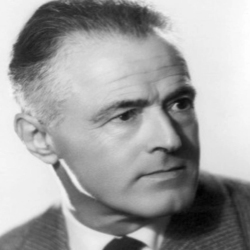
Ugo Betti
| Date of Birth | : | 04 Feb, 1892 |
| Date of Death | : | 09 Jun, 1953 |
| Place of Birth | : | Camerino, Italy |
| Profession | : | Playwright, Poet |
| Nationality | : | Italian |
Ugo Betti was an Italian judge, better known as an author, who is considered by many the greatest Italian playwright next to Pirandello.
Biography
Educated for the law, Betti fought in World War I and while imprisoned (1917–18) by the Germans wrote a volume of poems, Il re pensieroso (1922; “The Thoughtful King”). After the war he became a magistrate in Rome in 1920, rose to a judgeship in 1930, and became librarian at the Ministry of Justice in 1944. His legal career was interspersed with the writing of two more volumes of poetry, three books of short stories, a novel, much miscellaneous writing, and, most important, 26 plays.
His first play, La padrona (first performed 1927; “The Landlady”), drew mixed reactions, but later successful plays include Frana allo scalo Nord (first performed 1933; Eng. trans., Landslide, 1964), the story of a natural disaster and collective guilt; Delitto all’Isola delle Capre (first performed 1950; Eng. trans., Crime on Goat Island, 1960), a violent tragedy of love and revenge; La regina e gli insorti (first performed 1951; Eng. trans., The Queen and the Rebels, 1956), a strong argument for compassion and self-sacrifice; and La fuggitiva (first performed 1953; Eng. trans., The Fugitive, 1964), a story presenting legal courts as a symbol of world salvation. Corruzione al palazzo di giustizia (first performed 1949; Eng. trans., Corruption in the Palace of Justice, 1962) depicts an unscrupulous judge who, having clawed his way to the presidency of the Supreme Court, realizes his own guilt and gives himself up for trial.
International attention, offsetting lukewarm popular and critical acclaim in Italy, came with Paris productions in the early 1950s of his plays, which were then translated into English.
Death
died June 9, 1953, Rome.
Quotes
Who cares about great marks left behind? We have one life... just one. Our life. We have nothing else.
There is always a certain peace in being what one is, in being that completely.
Everyone has, inside himself ... what shall I call it? A piece of good news! Everyone is ... a very great, very important character.
To believe in God is to know that all the rules will be fair, and that there will be wonderful surprises.
When you want to believe in something, you also have to believe in everything that's necessary for believing in it.
It so difficult to know what the people we love really need.
Memories are like stones, time and distance erode them like acid.
Behind everything we feel, there is always a sense of fear.
At any given moment, I open my eyes and exist.
I think the family is the place where the most ridiculous and least respectable things in the world go on.
